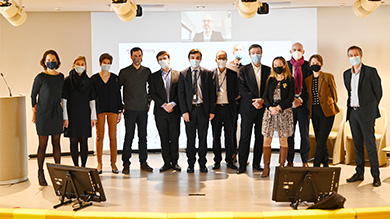The date will definitely go down in history for our company: on Thursday June 17, Natixis’ CEO Nicolas Namias along with the Chief Human Resources Officer Cécile Tricon-Bossard and the entire senior management committee signed the L’Autre Cercle LGBT+ charter of commitment, in the presence of All Equals. This four-point pledge marks a fresh stage in the development of our inclusion policy, and resolutely displays Natixis’ commitment to stand alongside its LGBT+ staff, sending a clear message to our various stakeholders – clients, employees, partners and job candidates.
Here Joëlle Gouraud and Frédéric Lenoir, co-chairs of Natixis’ LGBT+ network All Equals talk about the importance of this event.
Why is the signature of this charter of commitment so important for you?
Joëlle Gouraud: This is a huge step forward! Signing this charter is extremely symbolic as the company – as represented by senior management – has pledged to create a safe environment for LGBT+ staff and ensure equal rights for all. The charter is based on four pillars, that we have singled out as fundamental issues here at our association All Equals comprising Natixis staff, set up a year ago: development of an inclusive working environment, equal rights, support for staff who are victims of discrimination, sharing best practices.
Frédéric Lenoir: Beyond the actual signature of the charter and the symbolic nature of the initiative, this event also marks the commitment of our CEO, our Chief Human Resources Officer and all our senior managers, which we truly welcome. Beyond accepting all staff regardless of their sexual orientation, and far from any communitarianism, proselytism or activism, this move is really about inclusion for each and every person and our full range of diversity within our company. This is why we set up All Equals – our goal is for all staff here at Natixis to feel comfortable and at ease in themselves, it’s as simple as that. Inclusive companies are more attractive and post stronger performances: their staff are more engaged, and clients and the markets applaud this. It is 2021, companies can no longer practice “Don’t Ask Don’t Tell” policies: Obama put an end to this practice in the US army in 2008. We cannot tolerate the fact that half of LGBT+ staff – this is the figure in non-inclusive companies – do not dare talk about their private life at work for fear of repercussions for their career. And we cannot accept that talented candidates have doubts about joining Natixis because we did not communicate clearly on the subject.
What role did All Equals play in this signature?
JG: We put in a lot of work to prepare: over the past year, despite the Covid-19 crisis, we have seen a lot of staff get involved and strive to change things. We received messages of support and encouragement every week. All Equals is Natixis’ LGBT+ network: it has more than 300 members and allies right across the world. It is not particularly Paris-based or French – it is an international group.
FL: We got in touch with other organizations, we looked at practices in large financial sector companies, and many others have done. A lot of staff at did not understand why our company was not present on the theme of LGBT+ inclusion.
Have you experienced homophobia in your career?
FL: Yes definitely. Not particularly at Natixis, but I have heard homophobic comments and witnessed workplace discrimination. However, this is a more complex issue than outright discrimination, which is illegal – it is a grey area. There are a lot of prejudices and misconceptions, so raising awareness and promoting positive leadership are crucial in making progress.
FG: My wife is a police officer, she helped set up Flag, the LGBT+ network in the police twenty years ago already. You can hear very serious homophobic comments in police stations, but to say nothing and act like homosexuality does not exist is a serious situation too. Sometimes people say that it’s not the company’s problem, that it’s a private matter, but when you’re talking to your co-workers about your weekend over coffee on a Monday morning, they are not divulging their private lives. They just say “my wife”, “my husband”, “my children”. LGBT+ staff should be able to do the same without it putting a damper on the conversation. For a long time, they have had to hide the existence of their partner, look for ways to say as little as possible, avoid, be evasive. It’s exhausting and it’s unfair.
Do you feel like mentalities have changed?
FL: We know that we can count on our incredibly committed allies and we can rely on support from Natixis’ senior management, which is incredibly important. We have had a lot of feedback from staff thanking us for starting this conversation.
JG: We feel supported by management at Natixis, we feel recognized for our work in raising awareness via All Equals, which has played a role in accelerating acceptance. Natixis has made a very resolute commitment, and we will ensure that it stands the test of time.
How much progress still remains to be made?
JG: It is crucial to raise awareness and ensure training on these issues. Here at All Equals, we have worked a lot on challenging stereotypes and misconceptions. We work as a partner for HR staff and help pinpoint particular areas to monitor.
FL: There is still a lot of progress to make on parenthood, for example on the right to equal parental leave for the main parent, which I think should be the same in all families, both heterosexual and homosexual, i.e. around three months. This is also in the best interests of the baby.














